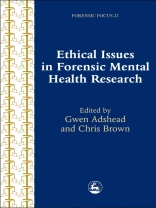A contemporary case-based discussion of ethical dilemmas faced by researchers in forensic mental health, this book offers useful guidance to anyone planning research in this field. It focuses on problems frequently encountered, such as issues of capacity to consent in forensic settings and the meaning of consent to participate. Chapters cover issues such as the procurement of consent among incarcerated people; the ability of young people to provide consent; the effects of culturally specific lay beliefs about mental illness; confidentiality; multidisciplinary approaches; and ethics in risk assessment research. The contributors address questions such as whether research can be therapeutic, and whether it is ever reasonable to compromise patient confidentiality for the wider benefits of publishing research.
Based on empirical data from researchers’ own experiences, this comprehensive book will be essential reading for anyone planning research in the area of forensic mental health, and all whose work is in this area.
Innehållsförteckning
Introduction, Gwen Adshead, Broadmoor Hospital and Christine Brown, University of Exeter. 1. Do you feel lucky? Assessing capacity to consent to research in forensic mental health practice, Gwen Adshead, Broadmoor Hospital. 2. In whose best interest: Consent by adolescence to research participation. Justine Rothwell, Mental Health Services of Salford and Carley Smith. 3. Dangerous stories: Consent and confidentiality in health and social care research, Christine Brown, University of Exeter. 4. User views and ethical issues in qualitative methods, Annie Bartlett, St George’s Hospital Medical School and Krysia Canvin. 5. Ethical issues from risk assessment research, Caroline Logan, University of Liverpool. 6. Multidisciplinary aspects of forensic mental health research, Tom Mason, South Wales Forensic Services. 7. Research ethics committees and research in forensic psychiatry, Gwen Adshead, Broadmoor Hospital and Christine Brown, University of Exeter. 8.Gender sexuality in research, Jean Ruane, University of Sheffield. Conclusion. Index.












